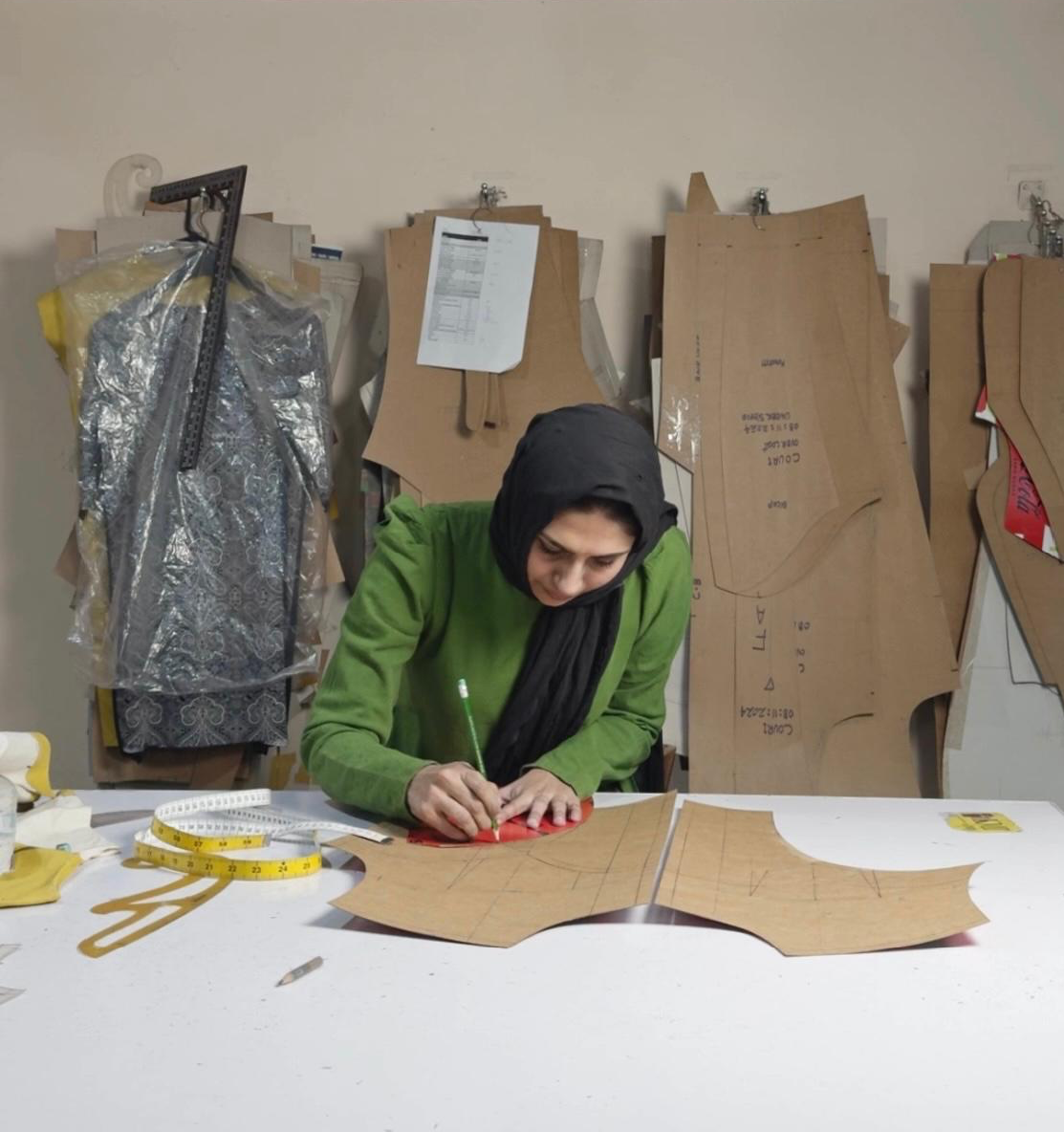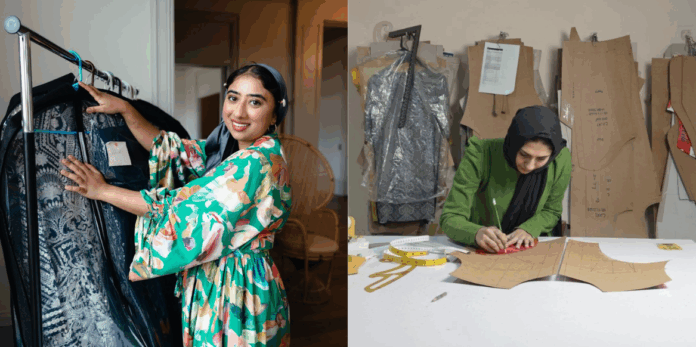The textile industry, driven by fast fashion’s cycle of overproduction and waste, is one of the world’s most environmentally destructive sectors. While consumers in wealthier countries enjoy cheap, fast-changing clothing, the Global South, particularly countries like Pakistan, bear the brunt of its ecological and human costs.
As a major cotton producer and exporter for Western brands, Pakistan plays a central role in the global supply chain, driven by economic pressures to offer low production costs and lax regulations. In 2023, Pakistan produced approximately 887,000 tons of pre-consumer textile waste and imported over 800,000 tons of second-hand clothing, much of it ending up in landfills or informal recycling streams. The textile sector accounts for roughly 9.5% of Pakistan’s industrial greenhouse gas emissions.
In agriculturally vital regions like Punjab, textile production significantly impacts land and water resources, with the production of cotton and denim being extremely water and energy-intensive. Weaving, bleaching and dyeing release harmful chemicals and untreated effluents into the environment, leading to marine ecotoxicity, soil degradation and serious health risks for local communities. Rivers such as the Ravi, once vital to farming, are now heavily contaminated by industrial runoff linked to the textile industry. The production of just one pair of jeans can require up to 7,500 litres of water, an alarming burden for water-scarce countries, including Pakistan. Meanwhile, farmers face worsening challenges from land degradation and water scarcity, further accelerating the loss of fertile land and deepening environmental crises. The unsustainable use of natural resources highlights the urgent need to consider local environmental conditions in global fashion supply chains.
Pakistan’s Informal Recycling Sector and Greenwashing
In cities such as Satiana and Karachi, the informal recycling sector depends heavily on low-paid, unprotected female labour, who sort chemically treated waste without proper safety measures. With 350 to 450 small-scale recycling units operating without regulation, traceability and compliance are nearly impossible. Meanwhile, less than 1% of clothing is recycled into new garments – a stark case of greenwashing. Without Extended Producer Responsibility (EPR) laws, brands face no obligation to manage their waste, leaving countries like Pakistan to shoulder the cost of a system built on exploitation.
Zille Huma – Sustainable Fashion Production in the Global South
In a fashion system that thrives on overproduction and disposability, Zille Huma stands out as a designer rooted in resistance. Born in a small agricultural village in Punjab, Zille Huma’s work, particularly for her slow fashion brand Xile, is inseparable from the land she comes from – a land now rapidly vanishing under the pressures of industrialization and climate change. Zille has witnessed firsthand the devastating impact of urban expansion in Pakistan: fast fashion labour exploitation, agricultural land replaced by factories, and rivers run dry and polluted. Her work is an urgent response to these transformations.
Zille was the first in her village to pursue a creative career, studying design at PIFD (Pakistan Institute of Fashion and Design) – where she now teaches – and later becoming the first Pakistani woman from her region to receive a full scholarship to Parsons School of Design in New York, where she completed her MFA in fashion. Her time abroad, surrounded by the concrete skyline of Manhattan, only deepened her attachment to the green landscapes of home. Her debut collection, rich in traditional hand embroidery, deadstock textiles, and reclaimed materials, bridges the tension between the industrial and the natural, the East and West. Zille displays her rare dual perspective: the deep-rooted connection to the land and a first-hand awareness of the modern challenges facing the fashion industry. For her, sustainability is a personal and political responsibility.

As a designer, Zille Huma sees the environmental impact of textile waste in Pakistan as urgent. “Water pollution from untreated dye and chemical runoff, massive landfill accumulation from synthetic fabrics, and excessive resource use in production,” she explains, are among the most pressing challenges.
These issues, she notes, are worsened by poor infrastructure and low public awareness, underscoring the need for sustainable design to become not just a choice but a necessity.
In her Lahore studio, Zille centres her work around waste-conscious design, upcycling, and the revival of indigenous craft. “Every scrap has a story,” she says. “I don’t see waste – I see possibility.” Her practice is grounded in using what already exists – deadstock fabrics, recycled textiles, and traditional handwoven materials like khaddar and organic cotton, while employing natural dyes and avoiding polluting chemical processes. These materials, she explains, are essential for reducing fashion’s reliance on synthetic fibres and chemically intensive processes, which are often responsible for high water consumption and environmental pollution.
By sourcing locally and avoiding industrial production lines, Zille also minimizes her carbon footprint and supports Pakistan’s struggling agricultural and artisanal economies. “Using handwoven and locally produced fabrics is not just environmentally responsible – it’s a way of keeping our heritage alive,” she says. Her collections, some of which take up to six months to produce, are built with this philosophy, favouring slow, intentional design over trend-driven turnover.
Her commitment to sustainability is deeply intertwined with her upbringing and educational journey. The contrast between the slowness of village life and the industrialized pace of urban Lahore – and later New York – shaped her understanding of fashion’s ecological toll. It also affirmed her belief that education is the first step toward environmental justice, especially in Pakistan. “I advocate for programs in schools where students can observe their surroundings and understand the environmental challenges caused by unsustainable practices,” she explains. Zille also delivers workshops, delivering techniques of hand-stitching and mending, helping others to cherish their clothes. Through both design and teaching, she encourages a new generation to challenge fast fashion’s wasteful norms.
The environmental challenges in Pakistan’s textile industry are immense, but she believes change begins at the narrative level. Designers, she argues, can reframe what fashion values: “We can shift fashion from fast and disposable to mindful and meaningful.” For her, this means elevating local craftsmanship, investing in circular production, and demanding transparency in supply chains. She also calls for global reforms – fairer labour standards, decentralized sourcing, and real opportunities for countries like Pakistan to lead in ethical production and design, not just supply cheap labour and resources. “Fashion should never demand too much from the planet. It should give something back.”
The environmental challenges in Pakistan’s textile industry are immense, but she believes change begins at the narrative level. Designers, she argues, can reframe what fashion values: “We can shift fashion from fast and disposable to mindful and meaningful.” For her, this means elevating local craftsmanship, investing in circular production, and demanding transparency in supply chains. She also calls for global reforms – fairer labour standards, decentralized sourcing, and real opportunities for countries like Pakistan to lead in ethical production and design, not just supply cheap labour and resources. “Fashion should never demand too much from the planet. It should give something back.”
Zille offers a model of fashion that is deeply rooted in land, memory, and respect for labour. It is a vision in which sustainability is embedded in every stitch – a celebration of tradition and a call to reimagine the future of fashion. Her upcoming art series draws on her agricultural roots, using vivid illustrations to explore the devastation caused by chemical waste and climate change. “This work is a plea to return to farming and organic living – before we lose the planet for future generations,” she says. Here are some of these pieces:
Hawa Patel, founder of Api’s Closet: Fashion Consumption in the Global North
Across the ocean, Hawa Patel is building a parallel solution rooted in community, faith, and circular fashion. With Apis Closet, a U.S.-based South Asian outfit rental platform set to launch in Summer 2025, she directly challenges the linear model of “buy, wear, discard” that dominates diaspora weddings and celebrations. Instead of importing expensive, one-wear garments, Apis Closet offers a system to a circular model of “rent, party, repeat”, reducing demand for new materials and extending the life of traditional outfits. By making South Asian fashion more accessible, inclusive, and reusable, Apis Closet brings cultural pride into the heart of the sustainability conversation.
Api’s Closet tackles the environmental and financial costs of traditional occasionwear. “Many South Asian outfits are imported, worn once, and forgotten,” Hawa explains. This issue is especially pronounced in South Asian weddings, which often span multiple days and events, creating pressure for attendees to wear a different, often brand-new outfit for each function.
Not only is that wasteful, “it is disrespectful to those who work so hard to make the pieces.” By participating in the circular economy, Apis Closet aims to reduce demand for virgin materials and keep garments out of landfills, offering a practical, low-waste solution especially relevant to Muslim and South Asian communities.
The environmental stakes are clear. “Renting vs. buying new is taking a step to break away from the single-use consumption and waste models that are the norm for society today,” she says. In many diaspora communities, traditional outfits are imported at high costs and worn only once. “By renting, the average consumer is reducing their waste contribution. Renting reduces the constant need to buy new fashion, thus reducing overconsumption.”
Hawa’s approach is shaped deeply by her faith and cultural identity. “ I believe it is my duty as a Muslim to not be a part of the degradation of the planet and society, at the hands of what I work and love the most- fashion.” For her, sustainability is a moral and spiritual commitment: “I have been blessed with life and I cannot justify using it to overconsume and rot the planet.”Her critique extends beyond personal consumption to the structural injustices in global supply chains. She emphasizes the need for ethical sourcing, traceability, and fair production for regions in the Global South that bear the brunt of fast fashion’s costs. Apis Closet’s sourcing partnerships prioritize small-batch artisan designers and responsible production, moving from mass manufacturing to intentional, value-driven fashion. Social sustainability, she says, is about championing artisans and giving their work the longevity and appreciation it deserves.
While she acknowledges that some parts of the fashion industry are making progress, particularly through ESG (Environmental, Social, and Governance) strategies adopted by retailers regardless of local law requirements, she is clear that deeper, systemic change is still needed. “Large-scale change will need to come from within because governments, especially in fashion-producing countries, historically have not passed legislation which protects the environment or garment workers.”
A just fashion future requires global accountability through stronger regulation and reparative justice, alongside local innovation such as the work of Zille Huma and Hawa Patel. Their efforts show how Muslim and South Asian communities can lead the way in building a fashion system rooted in cultural integrity, sustainability, and care.



